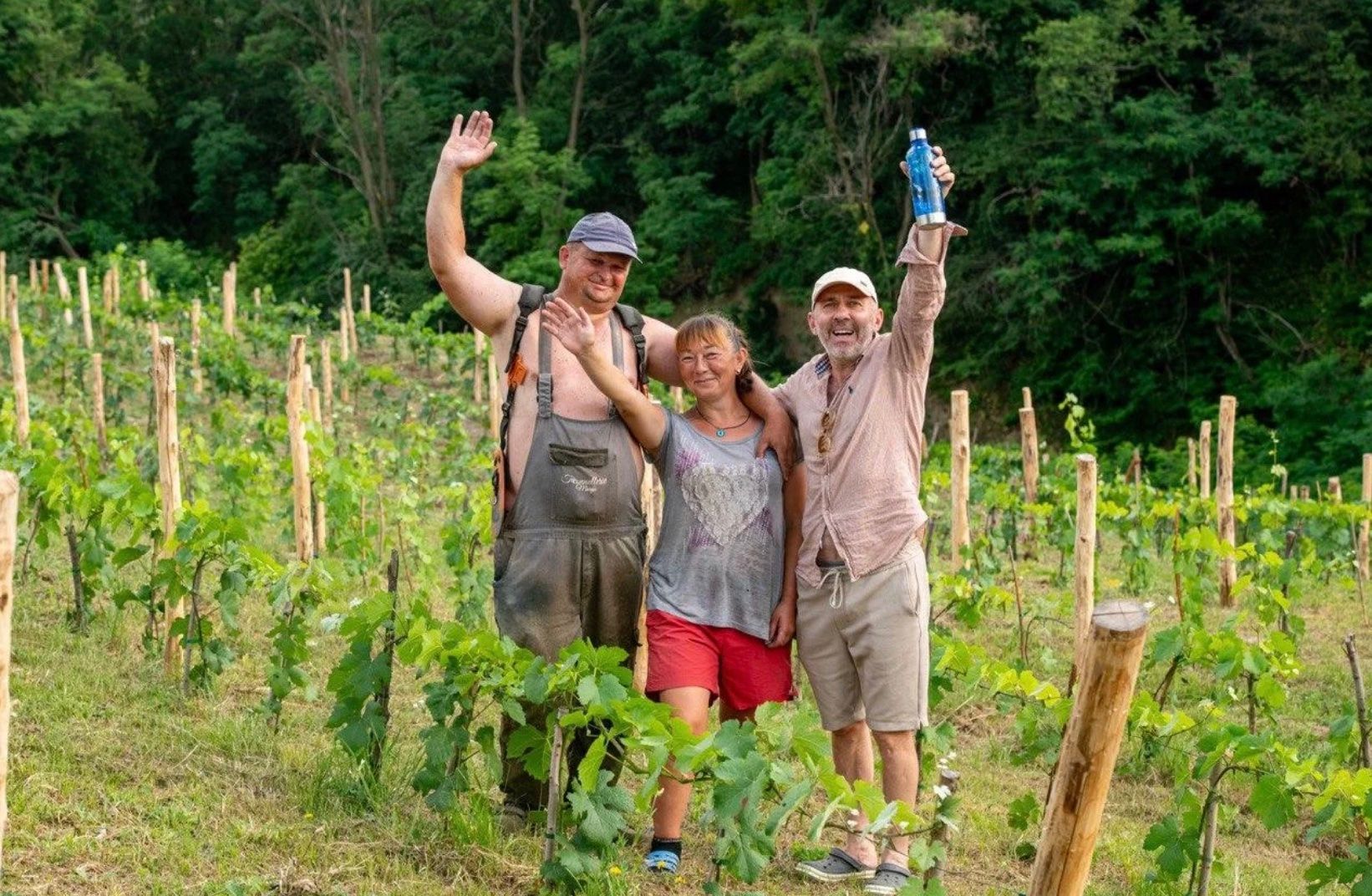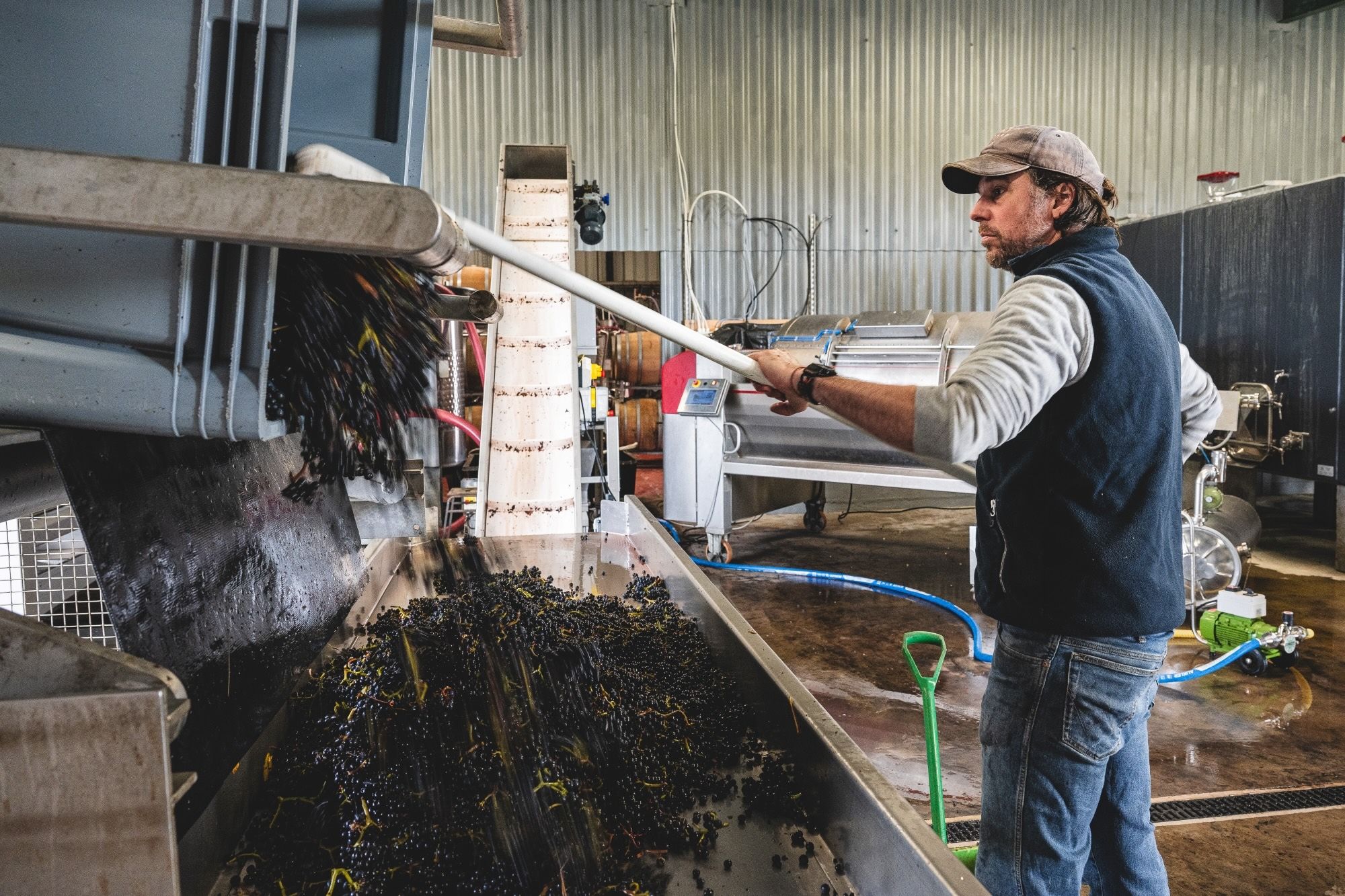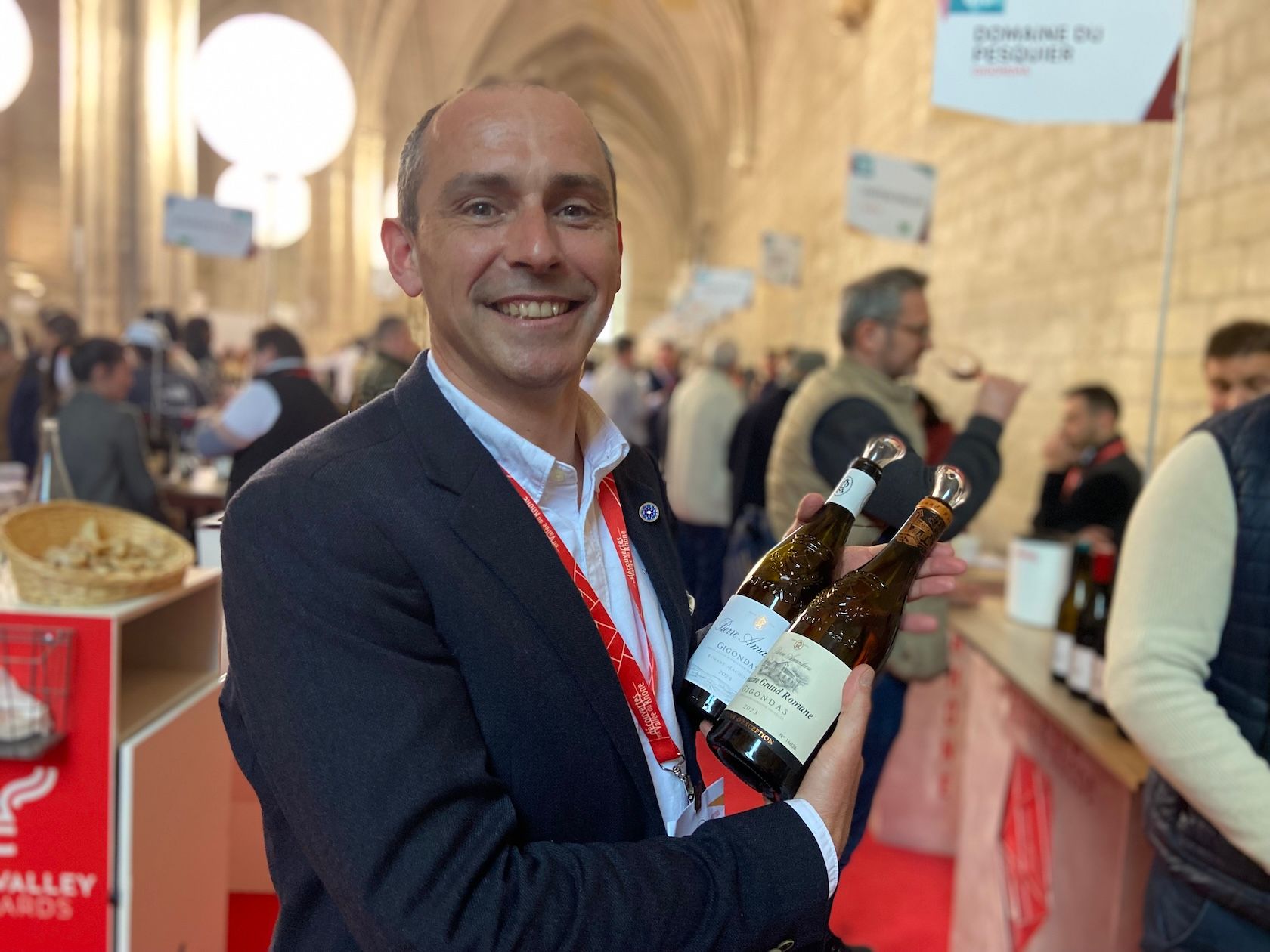The sixth WebWineWriting competition organised by Hungarianwine.eu looks to highlight up and coming talent around the world. This article by Victoria Makarova was first published on the Drinks+ website focused on the East European drinks industry.
“But, seriously, do you really have a bull’s horn filled with manure buried in the ground somewhere?” “Not just a horn. We have the whole skull. Would you like to take a look? Over here, behind the barn,” says winemaker, Ihor Petrenko, co-owner of Biologist, an organic and biodynamic winery located in the village of Lisnyky near Kyiv. He takes up the shovel, and one minute later there’s a cow’s skull in his hands, spreading a very peculiar “organic“ odour. Because, well, manure is manure.
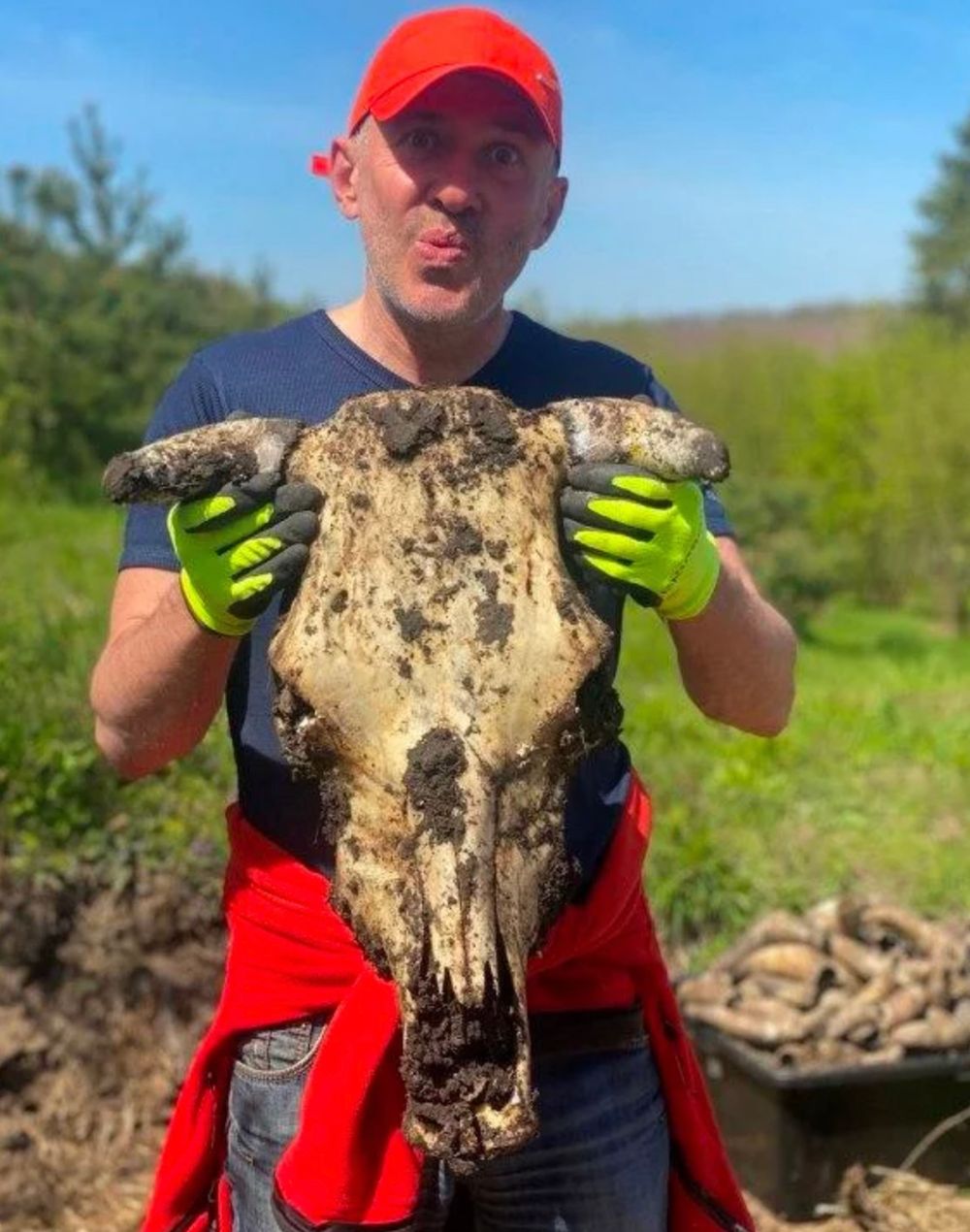
Ihor Petrenko is rightly proud of the cow’s skull that is at the heart of biodynamic winemaking at his Biologist winery in Ukraine
“We make preparations from fermented herbs, too: St. John’s wort, celandine, clover, nettle – in total, more than 20 varieties of plants and herbs growing in the neighbourhood. In biodynamics, it is important to use everything that is at hand, which is exactly what we do,” he adds.
“The bad news is, fermented herbs don’t smell very good either. Two weeks after the start of fermentation, when we add a little sulfur and copper to the vats and start cultivating the vineyards, even the birds fly away in horror, unable to stand this ombre, and the neighbours wonder if we have set up a pig farm in the vineyards. This situation usually lasts a couple of days – short, but rather intense. In a while the aroma dissipates, the birds come back, and the neighbours are happy and relaxed again.”
Biodynamics in Ukraine
Here we have to make a disclaimer regarding organic and biodynamic traditions in Ukraine. For Ukrainians, organic method is nothing unusual: even if we do not take into account the ancient history of Ukrainian winemaking, which is currently being actively researched and revived by experts and which, according to their estimates, dates back at least a couple of thousand years, we can be sure that Ukraine’s “new wave” winemakers, primarily craft ones, have been producing organic and natural wines for many years, even though they’ve never bothered with certification.
However, Biologist is the first Ukrainian winery to announce the use of the biodynamic method in viticulture and winemaking. This is the first year it has release a biodynamic wines under the symbolic name of Pershotvir, which, translated from Ukrainian, means “the first creation“.
Only a few years have passed from Petrenko‘s first acquaintance with biodynamic wines until releasing his first biodynamic wine.
“Even before I launched my own winery, I‘d heard a lot about biodynamics, but I hadn’t really immersed myself in the subject. In 2019 I was at ProWein in Dusseldorf on the stand of one of my favourite winemakers, Michel Chapoutier, and was particularly impressed by one of his wines from Condrieux – I think it was Coteau de Chery 2012.
“By then I was very familiar and loved Chapoutier‘s wines. However, that was not only the first biodynamic wine I tasted from him, but the first biodynamic wine I had ever tasted. I realised an inspired and professional winemaker, who knew what he was doing, could create truly make outstanding wines with the help of biodynamics.”
Taking inspiration
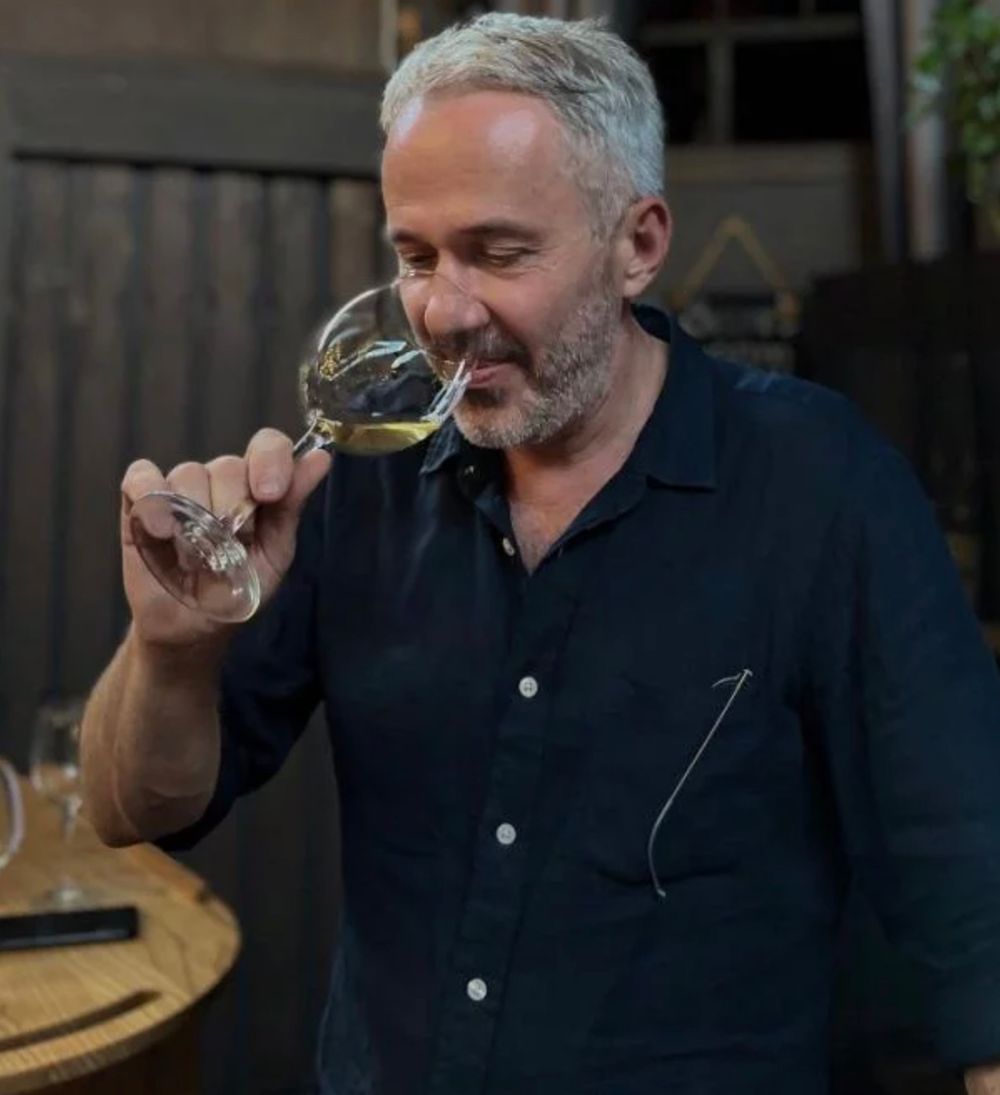
Ihor Petrenko has taken inspiration from leading biodynamic winemakers across Europe – particularly Michel Chapoutier
Among the “stars” of biodynamics, Petrenko singles out Nicolas Joly, Loire’s pioneer of the biodynamic movement. He also believes that excellent biodynamic wines are being produced in Tuscany and Alsace, and he is overly impressed by the transition of the winery producing the most expensive wines in the world, La Romanee-Conti, to biodynamic viticulture and winemaking.
However its the biodynamic wines of M. Chapoutier that remain iconic for Ihor Petrenko.
Inspired by these wines, he decided to set up biodynamic vineyards in two small plots near Kyiv, in the villages of Lisnyky and Bezradychy. Besides the biodynamic approach, these plots can boast a remarkable collection of grape varieties. In Lisnyky they are mainly French, Austrian and German varieties including two reds – Pinot Noir and Cabernet Sauvignon – and a range of whites – Grüner Veltliner, Müller-Thurgau, Weissburgunder (Pinot Blanc), Gewürztraminer, Riesling and Chardonnay.
In Bezradychy, the choice of vines is even more eclectic. The reds include Pinot Noir and Saperavi and the whites are made up of Aligote, Gewürztraminer and the famous Ukrainian indigenous grape, Telti-Kuruk, which, until now, has been grown only in the south of Ukraine, in Odesa and Mykolaiv regions.
Learning and trialling
This year Biologist expects its first vintage of Telti-Kuruk, grown in the north, near Kyiv. Currently, the total area of both vineyards does not exceed three hectares, but every year Biologist is expanding, planting new vines and looking for new plots.
Petrenko considers his decision to produce not only organic and natural, but also biodynamic wines, to be a completely logical development: First and foremost, biodynamics is all about autonomy and harmony, totally matching my vision and perception of the world. It’s a constant search for a healthy balance in the relationship between humans, plants and animals coexisting in the same space, as well as immune protection and maintaining the biodiversity of each plot. I felt this would be a very interesting path in viticulture and winemaking. So far, I have not regretted following it.”
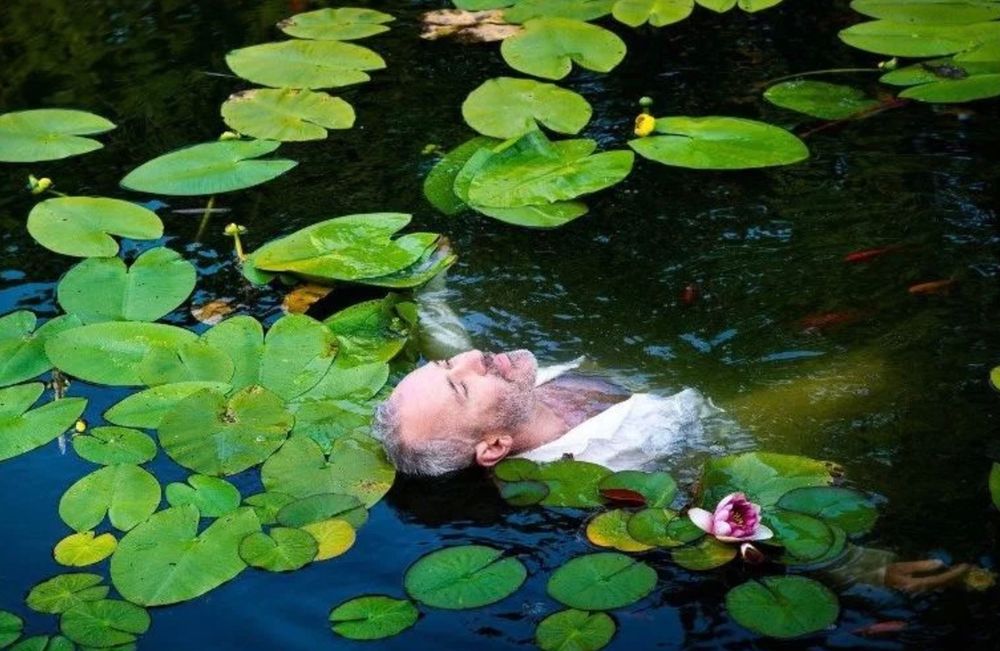
At home with nature – Ihor Petrenko says the journey to biodynamics has been hard but hugely rewarding
Petrenko’s background education in biodynamic agriculture comes from the AgroCare Ukrainian Center for Applied Biodynamics. Vitaly Vorontsov, the Center’s leading expert, advises Petrenko on cultivation, production of biodynamic preparations and other issues.
But biodynamics is a lot more than the set of rules for viticulture and vinification, he says. “I’m aware my current understanding of biodynamics is not complete. There is a long way of learning ahead of me. There are a lot of spiritual and philosophical issues that I have to study, to get a better understanding of the method and its true deep meaning. I read Rudolf Steiner’s works, and it’s never easy, but, step by step, I am moving forward.”
He considers the lack of local biodynamic winemaking expertise to be his biggest challenge: “I have spoken with several European biodynamic winemakers and they shared their experiences with me. But these were, mostly, basic things: the calendar, the list and recipes of preparations, nothing more. I still feel the need for a profound understanding of the biodynamic processes and professional consultations.”
Biologist’s wines
So how does he describe the biodynamic wines he is making?
“This is our first biodynamic vintage, 2022, and the first release of biodynamic wines by Biologist winery. The vines are still very young, these wines are not perfect and need some improvement, but I see a lot of potential in them. We took a risk and made this series of wines completely sulfur-free, so I give all our customers advice on how to store them properly.”
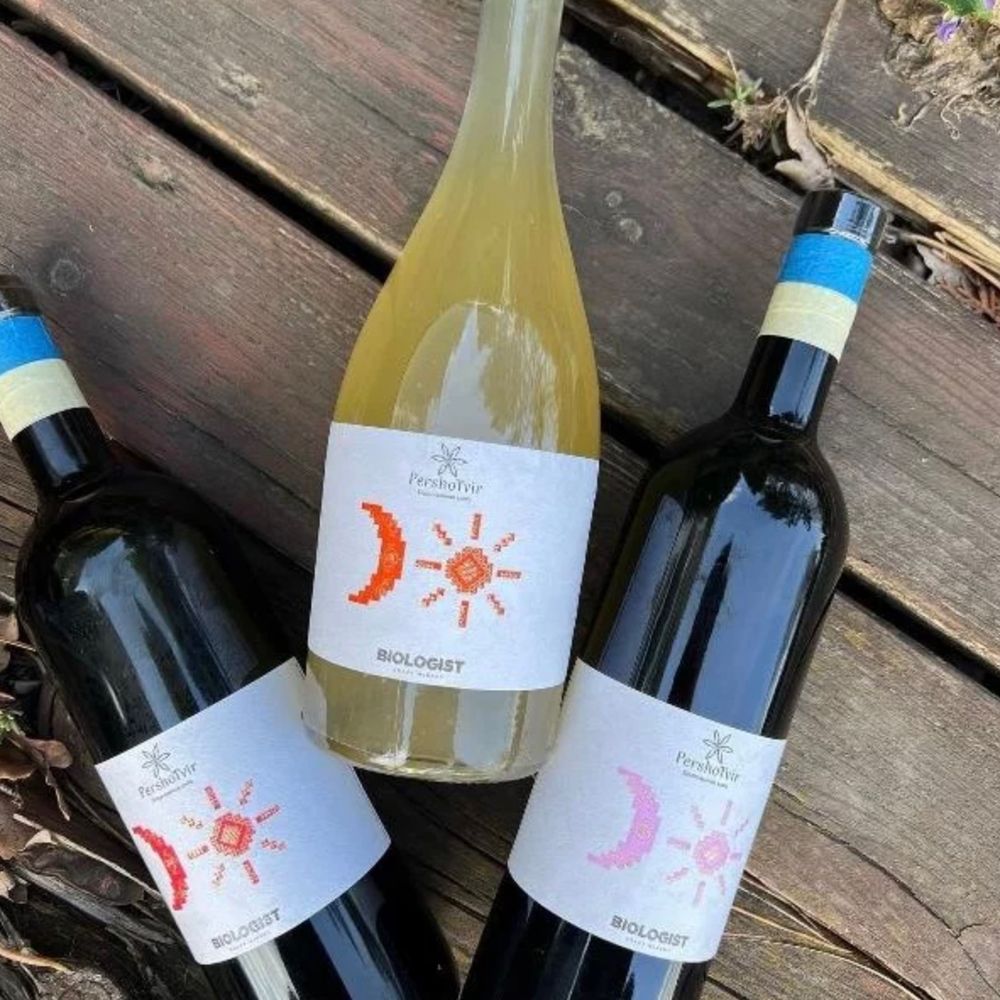
Biologist’s range of biodynamic wines
There are currently three dry wines in Biologist’s biodynamic series: Pershotvir Sparkling Biodynamics, a blend of three varieties – Chardonnay, Grüner Veltliner and Müller-Thurgau, methode ancestral; Pershotvir Rose Biodynamics – skin contact, a blend of Traminer, Chardonnay, Grüner Veltliner, Müller-Thurgau and Riesling; Pershotvir Red Biodynamics — a blend of Merlot, Pinot Noir, Cabernet Sauvignon and Carmenere.
These wines are bright and rich in aroma and taste, with a lot of character, despite the relatively young age of the vines, and also very “clean” despite the absence of sulfites and the usage of indigenous yeast.
What’s next?
Petrenko is certain he and the Biologist winery team will continue to improve their skills in biodynamics, aspiring for perfection: “There will be new releases, new wines, we will be able to study their development, experiment and create something new.”
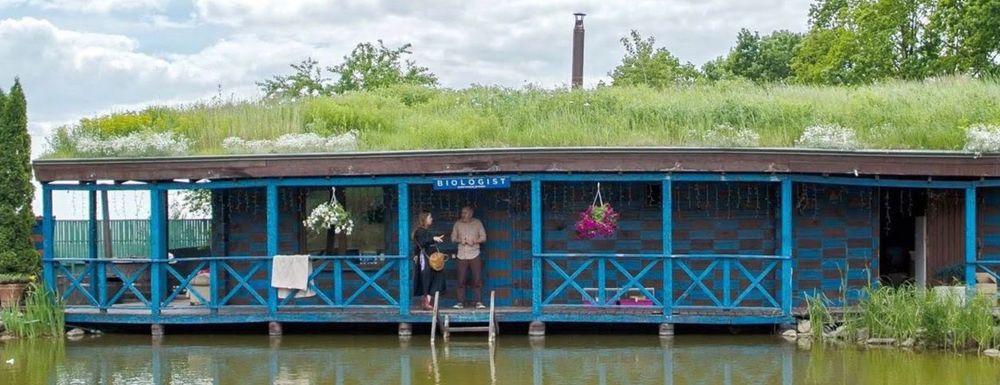
Biologist describes itself as a craft winery making biodynamic wines
He adds: “Last year we applied for an international certificate of organic production, and our application has been approved, so in less than a year we will be able to place the green leaf on our label. Right now we are in the process of completing our application for the Demeter certificate. Due to ongoing Russian military aggression in Ukraine, unfortunately, Demeter experts will not be able to visit our winery in the near future, so the certification will be only on paper for now, but the most important thing is that we are already entering the so-called “transition period”.
“Still, obtaining international certificates is not an overriding goal for us. Our biodynamic vineyards must gain strength and maturity. Currently, the volume of production of biodynamic wines in our winery is small, only 2-3,000 bottles per year. We are planting approximately 8-10,000 vines per hectare and we are increasing our ‘land bank’, so the production volume will increase too.”
One thing is clear Petrenko and his team are well and truly converted to biodynamics, as he explains: “Biodynamic winemaking is not an easy path, and I am often asked if it’s worth the effort. Is it, really? I think it is, at least I am extremely fascinated by the process. I was wondering if we’d be able to do it. In my opinion, we are. To be continued.”
WebWineWriting Competition
This article by Victoria Makarova is the winner in the biodynamic category of the sixth annual WebWineWriting competitionorganised byHungarianwines.eu. It was one of 56 entries into separate English and Hungarian language categories with articles received from the US, the Netherlands, Denmark, Norway, Greece, Spain, Chile, Italy, UK, Romania, Turkey, Poland, Portugal, France, Ukraine and Hungary.
The judging panel for the English language competition categories were:
- Tamlyn Currin, Elizabeth Smith, Florian Zaruba (Biodynamic stories)
- John Szabo MS, Prof. Guido Invernizzi, Tamás Dúzsi, Ágnes Németh (Old vines)
- Jonas Röjderman MW, Ritu & Rajiv Singhal, Bernadett Poós (My Hungarian wine experience)
The Buyer will be running the winners in the other categories in the coming weeks.
Wines of Ukraine Inaugural Tasting London October 9
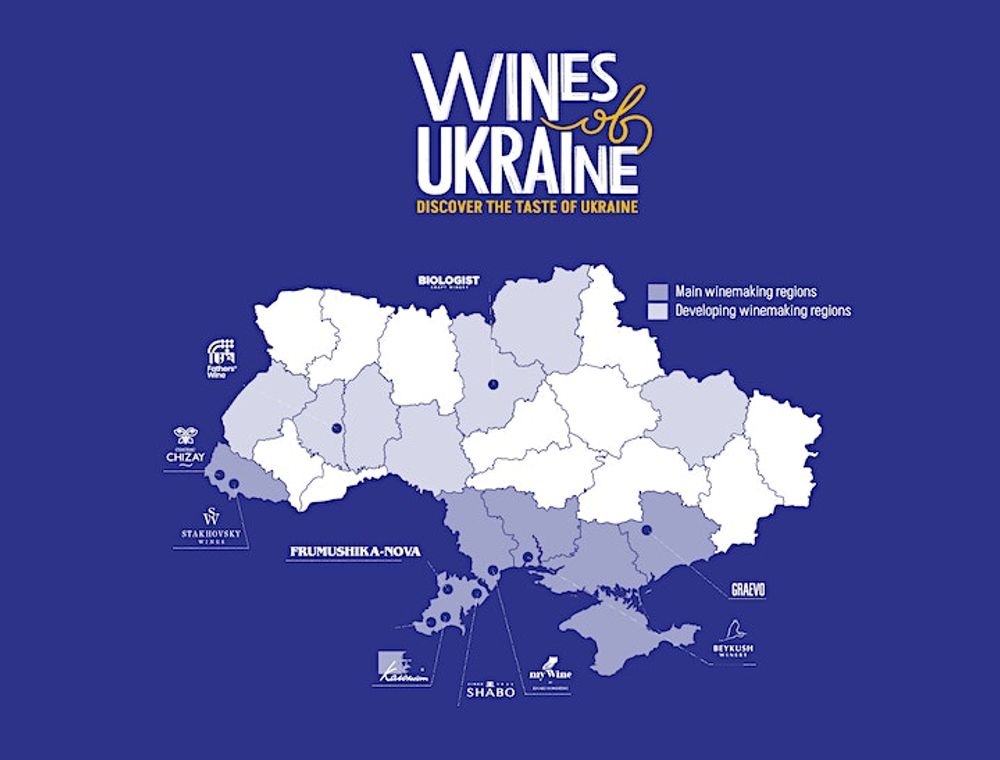
You can taste for yourself the quality of Biologist’s wines and the diversity across the across at the inaugural tasting of Wines of Ukraine on October 9 at 67 Pall Mall in London. This new body is made up of 15 Ukrainian producers, 12 of which will be at the tasting to show wines from across six Ukraine wine regions with up to 60 wines available to taste including sparkling, unfiltered orange and sweet wines and its range of reds, whites and rosés. Some wineries are seeking distribution in the UK.
The wineries taking part are:
- Beykush Winery, Mykolaiv
- Stakhovsky Wines, Zakarpattya
- Chateau Chizay, Zakarpattya
- Biologist Craft Winery, Kyiv
- Vynkhol Oksamytne /TM Villa Tinta, Odesa (Bessarabia subregion)
- Kolonist Wine, Odesa (Bessarabia subregion)
- Frumushika Nova, Odesa (Bessarabia subregion)
- Shabo, Odesa
- Tiras Winery /TM My Wine by Eduard Gorodetsky, Odesa
- Graevo, Zaporizhzhia
- Father’s Wine VB, Ternopil
- TM Bolgrad, Odesa
The event takes place on October 9 at 67 Pall Mall between 10.30am and 3.30pm. Click here for more and to register.
